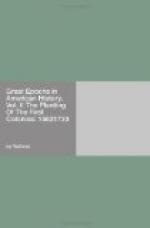It is desirable to understand how this population, destined to be the germ of a state, was constituted. Of members of the Massachusetts Company, it cannot be ascertained that so many as twenty had come over. That company, as has been explained, was one formed mainly for the furtherance, not of any private interests, but of a great public object. As a corporation, it had obtained the ownership of a large American territory, on which it designed to place a colony which should be a refuge for civil and religious freedom. By combined counsels, it had arranged the method of ordering a settlement, and the liberality of its members had provided the means of transporting those who should compose it. This done, the greater portion were content to remain and await the course of events at home, while a few of their number embarked to attend to providing the asylum which very soon might be needed by them all.
The reception of the newcomers was discouraging. More than a quarter part of their predecessors at Salem had died during the previous winter, and many of the survivors were ill or feeble. The faithful Higginson was wasting with a hectic fever, which soon proved fatal. There was a scarcity of all sorts of provisions, and not corn enough for a fortnight’s supply after the arrival of the fleet. “The remainder of a hundred eighty servants,” who, in the two preceding years, had been conveyed over at heavy cost, were discharged from their indentures, to escape the expense of their maintenance. Sickness soon began to spread, and before the close of autumn had proved fatal to two hundred of this year’s emigration. Death aims at the “shining mark” he is said to love. Lady Arbella Johnson, coming “from a paradise of plenty and pleasure, which she enjoyed in the family of a noble earldom, into a wilderness of wants,” survived her arrival only a month; and her husband, esteemed and beloved by the colonists, died of grief a few weeks after. “He was a holy man and wise and died in sweet peace.”
[1] From Palfrey’s “History
of New England.” By permission of and
by arrangement with the authorized
publishers, Houghton, Mifflin
Co. Copyright, 1873.
LORD BALTIMORE IN MARYLAND
(1633)
BY CONTEMPORARY WRITERS[1]
On Friday the 22 of November 1633, a small gale of winde comming gently from the Northwest, weighed from the Cowes, in the Ile of Wight, about ten in the morning; & (having stayed by the way twenty dayes at the Barbada’s, and fourtene dayes at St. Christophers, upon some necessary occasions,) wee arrived at Point-Comfort in Virginia, on the 24. of February following, the Lord be praised for it. At this time one Captaine Claybourne was come from parts where wee intended to plant, to Virginia, and from him wee vnderstood, that all the natiues of these parts were in preparation of defence, by reason of a rumour somebody had raised amongst them, of sixe ships that were come with a power of Spanyards, whose meaning was to driue all the inhabitants out of the Countrey.




